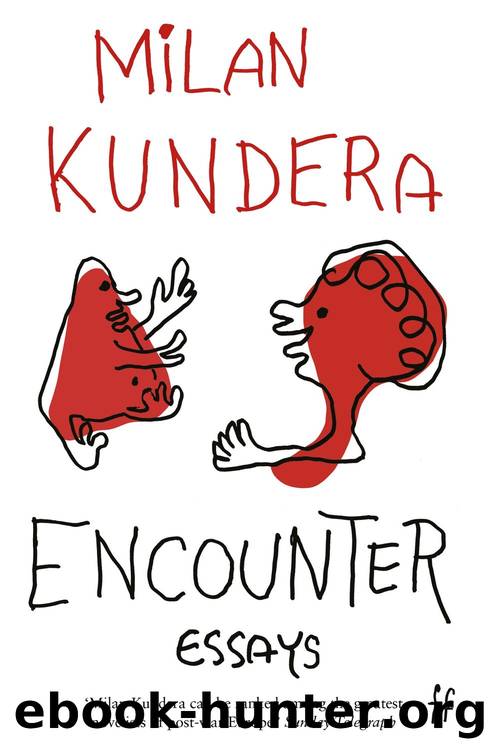Encounter by Milan Kundera

Author:Milan Kundera [Milan Kundera]
Language: eng
Format: epub
ISBN: 9780571367726
Publisher: Faber & Faber
Published: 2020-07-14T16:00:00+00:00
Home and the World
âI SAY WE ARE SMOTHERING. THE PRINCIPLE OF A HEALTHY Antillean politics: Open the windows. Air. Air,â Césaire wrote in 1944, in the journal Tropiques.
Open the windows toward which direction?
First of all toward France, says Césaire; for France is the Revolution, itâs the great abolitionist Schoelcher, and itâs also Rimbaud, Lautréamont, Breton; it is a literature and a culture worthy of the greatest love. Next, open them toward the African past, a past amputated, confiscated, that holds the buried essence of the Martinican personality.
Later generations would often dispute Césaireâs Franco-African orientation, insisting on the Americanness of Mar tinique; on its âcréolitéâ (connoting the whole array of skin colors and a language of its own); on its bonds with the Antilles and with all of Latin America.
Because every people in search of itself thinks about where to locate the margin between its own home and the rest of the world, the location of what I call the median context, the realm between national and global contexts. For a Chilean that median context would be Latin America; for a Swede, it is Scandinavia. Obviously. But what about Austria? Where was that margin located? In the Germanic world? Or in the world of multinational Central Europe? The whole meaning of Austriaâs existence depended on the response to that question. When, after 1918 and then still more radically after 1945, it had left the context of Central Europe, it turned back into itself or into its Germanness, it ceased to be that shining Austria of Freud or Mahler, it was a different Austria, and with far more limited cultural influence. The same dilemma faced Greece, which inhabits both the world of Eastern Europe (Byzantine tradition, Orthodox Church, Russophile orientation) and the world of Western Europe (Greek-Latin tradition, strong bond to the Renaissance, and modernity). In impassioned polemics the Austrians or the Greeks can argue for one orientation over another, but with a little detachment we would say: there are some nations whose identity is characterized by duality, by the complexity of their median context, and thatâs precisely what gives them their particularity.
As to Martinique, I would say the same thing: the coexistence of various different median contexts there is what makes for the particularity of its culture. Martinique: a multiple intersection; a crossroads among the continents; a tiny slip of land where France, Africa, the Americas meet.
Yes, thatâs beautiful. Very beautiful, except that France, Africa, America donât much care. In todayâs world the voice of small entities is barely heard.
Martinique: the encounter of a great cultural complexity with a great solitude.
Download
This site does not store any files on its server. We only index and link to content provided by other sites. Please contact the content providers to delete copyright contents if any and email us, we'll remove relevant links or contents immediately.
The Hating Game by Sally Thorne(19238)
The Universe of Us by Lang Leav(15068)
Sad Girls by Lang Leav(14407)
The Lover by Duras Marguerite(7893)
The Rosie Project by Graeme Simsion(6381)
Smoke & Mirrors by Michael Faudet(6184)
Big Little Lies by Liane Moriarty(5790)
The Poppy War by R. F. Kuang(5687)
The Shadow Of The Wind by Carlos Ruiz Zafón(5686)
An Echo of Things to Come by James Islington(4854)
Memories by Lang Leav(4795)
What Alice Forgot by Liane Moriarty(4625)
From Sand and Ash by Amy Harmon(4506)
The Poetry of Pablo Neruda by Pablo Neruda(4098)
The Tattooist of Auschwitz by Heather Morris(3844)
Ficciones by Jorge Luis Borges(3627)
The Rosie Effect by Graeme Simsion(3461)
Guild Hunters Novels 1-4 by Nalini Singh(3460)
THE ONE YOU CANNOT HAVE by Shenoy Preeti(3368)
